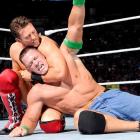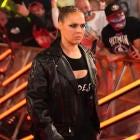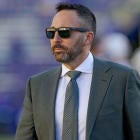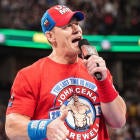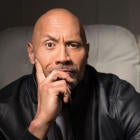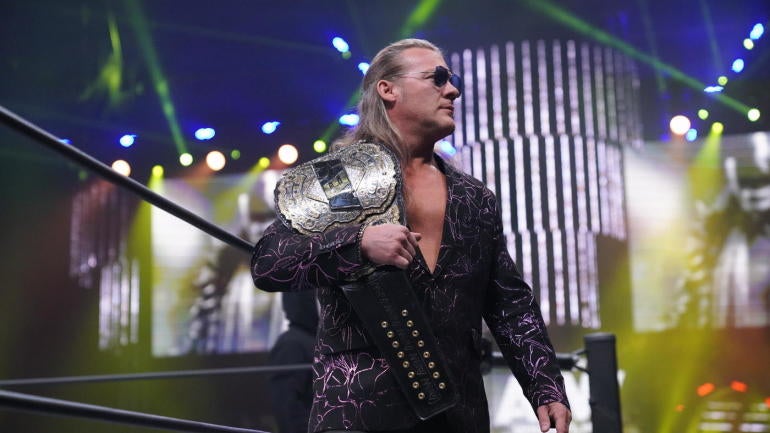
It would be hard to find a more candid or powerful moment in the VICE TV documentary on the life and death of Chris Benoit than the soundbite delivered by his friend and fellow former WWE star Chris Jericho.
The two-hour special episode, which premieres Tuesday (9 p.m. ET/PT) as the kickoff to Season 2 of VICE's "Dark Side of the Ring" series, explores the inside details of Benoit's 2007 suicide and double-murder of his wife, Nancy, and seven-year-old son, Daniel.
"I need to talk about this," Jericho said in the opening two minutes. "If you don't want to hear it, if you're going to give me sh-- about it later and say I'm glorifying a murderer, stop listening now."
Mentioning Benoit's name in any form has been an understandably polarizing move that is typically avoided, particularly by WWE, which has largely removed the wrestler once known as "The Crippler" from its history books.
Yet for the first time, VICE has brought together those who were most closely affected by the tragedy -- from those close to Benoit in wrestling like Chavo Guerrero and Dean Malenko to Benoit's surviving son, David, and Nancy's sister, Sandra Toffoloni.
Although the film explores at length the likely role that CTE played in Benoit's tragic turn, Jericho echoed the opinion of most in the documentary by telling the CBS Sports "State of Combat" podcast on Monday that "we can speculate and come up with our own theories" as to Benoit's motives but "we will never understand" and "none of that will change."
Jericho's biggest lament in the documentary was that pro wrestling, the only thing he claimed the perfectionist Benoit truly loved in his life, was the exact same thing his death nearly destroyed some 13 years ago. The murders rocked the industry amid a rampant outbreak of untimely deaths -- including that of Benoit's best friend, Eddie Guerrero -- forcing a re-examination from WWE into the wellness of its performers.
"For me, it was telling my story probably for the last time on this subject because once you have talked about it on audio, written about it and now it's on video with television, I don't think there is really much more to say," Jericho said. "I think that I was glad to go through it and come to terms with it and let everyone know my perspective of it. It has been 12 or 13 years and nothing has changed."
Jericho compared WWE's handling of Benoit's legacy since the murders to how little former NFL legend O.J. Simpson's on-the-field accomplishments are talked about since the fallout of his murder accusations in 1994.
"How could it not be?" Jericho said of Benoit's removal from WWE history. "I'm so close to it, having had some of the greatest matches of my career against Chris Benoit in matches that can never be seen again for obvious reasons. I understand why people might not want to watch him. I understand why people might want to watch him.
"I have no problems either way. I understand both sides of the coin. There are close friends of mine who did not want to watch this documentary, and I understand that. If you don't want to watch, if you think it's too heavy to watch and don't like the vibe that it gives you, then don't. But it really is a great piece of work done well by so many people."
Although Benoit turned pro five years before Jericho in 1985, the careers of each constantly intertwined. Both were trained by the legendary Hart family in Calgary, Alberta, Canada. After short stints for both in ECW, Jericho and Benoit joined the likes of Eddie Guerrero and Malenko in helping to change the business in the late 1990s with WCW by bringing the cruiserweight style to the forefront.
All four wrestlers then went on to big-time success in WWE at the turn of the next decade as Benoit, using what Jericho described as a "Clint Eastwood-type character," participated in the main event of WrestleMania 20 in 2004 and cemented himself as one of the best technical wrestlers worldwide.
"[Benoit] was definitely one of the best of all time," Jericho said. "Very intense in the ring, very smart in the way he put together matches. Just a really great performer all across the board. He really was a huge influence on me as a performer and one of the greatest of all time for sure.
"If you didn't know anything personally about him or weren't involved in things that happened, you might want to study his work, as you should as a young performer who didn't really know the whole situation."
It's because of that situation, however, that younger fans know so little about the many in-ring classics Benoit has helped author. While Jericho looks back fondly on his 2001 ladder match against Benoit at the Royal Rumble and their TLC III match four months later, it's a tag team match on May 21, 2001 that he is most proud of.
"The one that comes to mind that people have said is the best Raw match of all time is Jericho and Benoit versus Steve Austin and Triple H for the WWE tag team titles when Hunter tore his quad," Jericho said. "That is one of the best matches you will ever see, in my opinion, and it's one of the best matches you will never see because of Chris' involvement. If there's anyway you can find that match and watch it through, it's unbelievable."
If there's an even bigger tragedy that has come from this story, Jericho believes it's how much the wrestling contributions of Benoit's wife, Nancy, known as "Woman" throughout her pro wrestling managerial career, have become an afterthought.
"She was a great performer and had a Hall-of-Fame worthy career as sort of a pioneer in that role as a valet, manager or personality," Jericho said. "I think that when you marginalize her life and define it by the way it ended, I find it very unfair not just to her as a person but as a performer. That is one of the things I would love to see at some point is a little bit more of her to be shown as a performer and not just as a victim. I think it's important to understand that she did have a huge career in the wrestling business before she met Chris Benoit."








